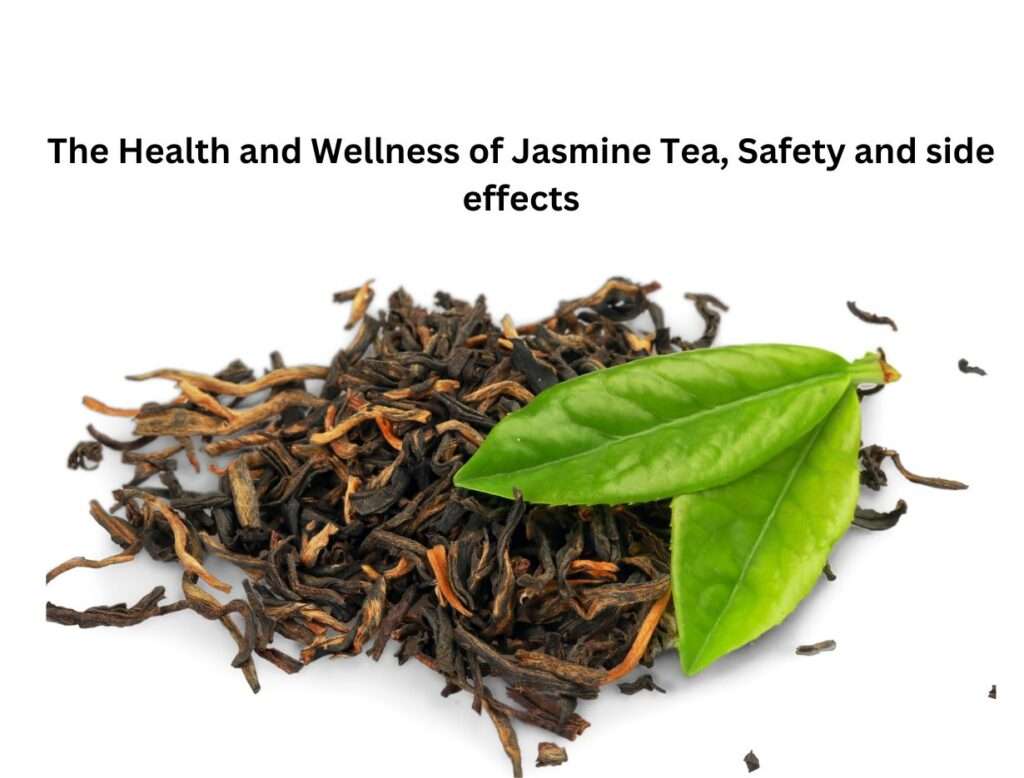What is Jasmine health benefits Tea ?
Jasmine health benefits tea is made from the petals of the Jasmine flower, as the name suggests. The original method of making jasmine tea is to first combine the petals with loose green tea leaves. This gives the tea a floral aroma. As simple as it sounds, the traditional method is time-consuming, requiring layering the petals around the tea at least 9 to 10 times to achieve the rich flavour. The scented leaves are then dried and packaged before being sent to market. Layering is usually done overnight because that is when Jasmine flowers bloom the most.

9 Reasons Why Jasmine Tea Is Beneficia
Jasmine tea is a type of tea that is scented with the aroma of jasmine blossoms.
Jasmine tea is a type of tea that is scented with the aroma of jasmine blossoms.
Blossoms of common jasmine (Jasminum officinale) or sampaguita (Jasminum sambac) are stored alongside tea leaves or blended with stored tea to infuse the aroma.
Because jasmine tea is typically made from green tea leaves, it contains many of the same powerful health benefits as green tea.
Here are nine reasons why drinking jasmine tea is good for you.
1.Packed with antioxidants
Jasmine tea is high in polyphenols, which are powerful plant-based compounds. These act as antioxidants in the body, protecting cells from free radical damage. Free radical damage has been linked to heart disease and several types of cancer in studies. Jasmine tea made from green tea is high in catechins, which are polyphenols.
One particularly potent catechin in green tea is epigallocatechin gallate (EGCG), which has been linked to a variety of health benefits, including weight loss and improved blood sugar control, as well as heart and oral health. Furthermore, green tea catechins such as EGCG have been shown to have anti-inflammatory and blood-lipid-lowering properties, which may lower your risk of heart disease.
2.Could help with weight loss
Drinking jasmine tea may aid in weight loss by increasing metabolism. In fact, a review of several studies suggests that green tea the most common base for jasmine tea may increase metabolism by 4-5% and fat burning by 10-16%. While 4-5% may appear insignificant, it could equate to an additional 70-100 calories burned per day.
The fat-burning properties of jasmine tea are linked to its caffeine and polyphenol EGCG content. These compounds may also boost each other’s fat-burning abilities.
3.It has the potential to protect your heart.
Polyphenols found in jasmine tea may help protect against heart disease. Tea polyphenols have been shown in animal and test-tube studies to protect LDL (bad) cholesterol from oxidising — a process that increases your risk of heart disease. Because it is more prone to stick to artery walls and form plaques, oxidised LDL cholesterol may be detrimental. Your blood vessels may narrow or clog as a result of this.
In one study, adding green tea polyphenol supplements—which are also present in green tea-based jasmine tea—reduced plaque formation in hamsters by as much as 68%. Additionally, it decreased triglyceride and LDL cholesterol levels, two heart disease risk factors. Additionally, several research have connected drinking tea to a lower risk of heart disease.
4.Encourages good oral health
Green tea, which is high in catechins, is commonly used to make jasmine tea. Catechins are a type of polyphenol that may help prevent tooth decay by killing plaque-forming bacteria such as Streptococcus mutans. In a 15-person study, a solution containing green tea catechins inhibited the production of acid by Streptococcus mutans when applied to the teeth. Too much acid can erode the enamel on your teeth, which is the hard surface of your teeth.
Another study of 30 people found that using a green tea catechin-based mouthwash for one week was just as effective as using an antiseptic mouthwash at reducing dental plaque.
Not to mention, some studies suggest that jasmine tea may combat bad breath by reducing odor-causing bacteria.
5.It has the potential to improve brain function.
Jasmine tea contains several properties that may aid in brain function. To begin with, it contains 15-60 mg of caffeine per cup (237 ml), depending on how long the tea leaves steep and the type of tea used as a base.
Additionally, caffeine increases mental activity and facilitates the production of other neurotransmitters that improve mood, such as dopamine and serotonin. When combined, these factors increase your feeling of alertness, energy, and short-term memory.
6.Might be able to fend against Parkinson’s and Alzheimer’s disease
Strong polyphenols found in jasmine tea may reduce your risk of developing Alzheimer’s and Parkinson’s disease. In particular, green tea-infused jasmine tea has a high EGCG content that may reduce inflammation and counteract free radical damage, two important aspects of the evolution of both Alzheimer’s and Parkinson’s disease.
EGCG has been shown in test tubes to prevent proteins in the brain from misfolding and clumping. Misfolded proteins may promote inflammation and damage brain nerves, lowering your risk of Parkinson’s and Alzheimer’s disease. According to a meta-analysis of eight studies involving over 5,600 people, people who regularly drank teas like green tea — the most common base for jasmine tea — had a 15% lower risk of Parkinson’s disease than non-tea drinkers.
7.It may reduce your risk of developing type 2 diabetes.
Diabetes affects over 422 million people worldwide. Type 2 diabetes is the most common type and occurs when your body is unable to effectively use insulin. Insulin is a hormone that aids in the transport of sugar from the bloodstream to the cells.
Green tea jasmine tea may reduce your risk of type 2 diabetes. It contains the compound EGCG, which may assist your body in more effectively using insulin and lowering blood sugar levels. An analysis of 17 studies involving 1,133 people revealed that drinking green tea significantly reduced fasting blood sugar and insulin levels.
Another study of 12 studies involving over 760,000 people discovered that drinking 3 cups (710 ml) or more of tea daily was associated with a 16% lower risk of type 2 diabetes.
8.It may lower your risk of certain cancers.
Jasmine tea has a lot of antioxidants that help prevent free radical damage and may be able to combat cancer.
9.Delectable and simple to include in your diet
Jasmine tea is not only delicious and simple to incorporate into your diet, but it is also highly healthful. It tastes sweet and mild with a floral fragrance. Tea is available in tea bags, loose tea leaves, and pearls. Even so, it’s preferable to use loose leaves or pearls as tea bags frequently contain damaged leaves and other unwanted plant pieces that might alter the flavour of the tea.
Simply place the leaves or pearls in a pot with hot water heated to 160–180°F (70–80°C) to prepare them. The delicate flavour of the tea can be ruined if you use boiling water. After 3-5 minutes of steeping, filter the tea and serve.
Safety and side effects
In general, jasmine tea has very few if any negative side effects and is highly nutritious.
It does, however, contain caffeine, which some individuals may find problematic. Too much caffeine can have negative side effects like anxiety, jitters, and gastrointestinal problems.
Caffeine should be avoided during pregnancy as it may increase the chance of miscarriage.
Catechins in jasmine tea may reduce your body’s ability to absorb iron from foods. Catechins, in large amounts, may increase your risk of iron deficiency anaemia. However, this is mostly true for people who are at risk of iron deficiency, such as pregnant women, young children, and people with dietary restrictions.
However, if you are at risk of iron deficiency, drink jasmine tea between meals rather than with them — or wait at least an hour after eating to drink the tea.
In conclusion
Jasmine tea is a very healthy tea that is typically made from green or black tea leaves. It’s high in antioxidants and has been linked to a slew of impressive health benefits. Drinking jasmine tea, for example, may reduce your risk of heart disease, mental decline, and certain cancers. It may also aid in weight loss, oral health, and cognitive function. Best of all, jasmine tea is delicious and simple to incorporate into your diet. To reap the tea’s impressive health benefits, try incorporating it into your diet.



